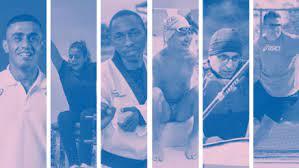
Meet the athletes of the Refugee Paralympic Team | sportanddev.org
For more info: UNHCR - Sport partners
On 30 June 2021, the International Paralympic Committee (IPC) named six athletes from four nations selected to be part of the first ever Refugee Paralympic Team (RPT) for the upcoming Tokyo Games. The six athletes hail from Afghanistan, Burundi, Iran, and Syria. The team also includes swimmer Ibrahim Al Hussein, who participated in the Rio Games in 2016 as an independent athlete.
The IPC is working with UNHCR, the UN Refugee Agency, to provide these remarkable athletes the opportunity to share their story at the Games and deliver a message of hope and inspiration to others who have been forcibly displaced. Here are the six athletes that have been selected as part of the RPT:
1. Ibrahim Al Hussein (Swimming)
Ibrahim al Hussein is a Syrian refugee who competed in the 2016 Rio Paralympic Games as part of the two-person Independent Paralympic Team. His selfless act to rescue his friend in Syria set off a series of random acts of kindness from strangers that helped make his journey to Tokyo possible.
After victories in Greek disabled competitions, he was approached by the Hellenic Olympic Committee. A keen swimmer since childhood, he described competing in the Paralympics as a dream come true. “I want every refugee to have access to sports opportunities. I can't imagine my life without sport,” Ibrahim said.
2. Alia Issa (Club throw)
The first female Paralympic refugee athlete and the youngest member of the team, Alia Issa is a Syrian refugee living in Greece who will compete in the club throw, a specialty event for athletes who are unable to handle a javelin, shot put or discus. Attending a special school only for students with disabilities gave her the confidence she needed: “I didn't feel different anymore. At my primary school, I was the only one with a disability.”
She began participating in sports three years ago at her school in Greece, and she now competes internationally. Recently, she placed fourth at the 2021 World Para Athletics European Championships. She's carrying a special message for women with disabilities to Tokyo: “Do not stay inside your homes. Get active. It will give you your independence and a way to be included in society.”
3. Parfait Hakizimana (Taekwondo)
Parfait Hakizimana is the only athlete going to the Tokyo Paralympic Games directly from a refugee camp.
Hakizimana took up Taekwondo at the age of 16, after losing his arm, stating that it “saved me and lifted my spirits.” In 2010, he got his black belt and opened a Taekwondo club in Burundi. After rising violence in his home country of Burundi, he fled for Rwanda in 2015, escaping civil war.
A year later, he used his prior experience to start a Taekwondo club in Mahama Refugee Camp.
He now trains around 150 people in the camp, including children as young as six-years-old. Parfait credits the values of respect, friendship, and competitiveness promoted by Taekwondo with helping him to find his own place in a new country. “Refugees don’t have a lot. But sport helps them forget their troubles,” he explained.
4. Abbas Karimi (Swimming)
Abbas Karimi was born without both arms and faced discrimination in his homeland, Afghanistan, as a result of his disability and his ethnicity. He fled to Turkey, where he lived as a refugee for four years before being resettled in the US.
Despite being told at an early age that he couldn't swim without arms, Abbas plunged into a pool wearing a life jacket and drew the attention of an Afghan swim coach. Abbas has won eight medals and made history as the first refugee athlete to win a medal in the men's 50-meter butterfly, which he did at the 2017 World Para Swimming Championships in Mexico City.
He hopes to add a medal from Tokyo to his collection. “I believe I have the potential to make the Paralympic podium, and I believe it is crucial for all refugees and our legacy that one of us refugee athletes hit the podium, because it may inspire and bring hope to refugees,” he said.
5. Anas Al Khalifa (Canoeing)
Anas Al Khalifa is a Syrian refugee who escaped the civil war, fleeing to Turkey before resettling in Germany in 2015.
For Al Khalifa, making the refugee team is something he could have never imagined. “There was so much destruction around me and the war, going through refugee camps and having to jump from border to border,” he said.
He was introduced to para canoeing by his physiotherapist and his commitment to training and the encouragement of his coach allowed him to make remarkable progress. “When I go to train, sport is kind of demonstrating how you can accomplish a lot of things while forgetting about the disability. It makes you feel like you don’t have any impairment anymore,” Anas said.
6. Shahrad Nasajpour (Athletics)
Nasajpour was always passionate about sports. He began his athletic career by playing table tennis before transitioning to athletics. After relocating to the United States from Iran in 2015, he approached the IPC about the idea of a refugee team for Rio, eventually making it to the Rio Games as an independent athlete.
He plans to focus on sports management, to become a leader in sport and utilise his background as an athlete. To other aspiring athletes, he advises: “Try to find different ways to get to your goals and eventually you may get where you want to be.”
sportanddev published this content as part of our partnership with UNHCR, the UN Refugee Agency. For more information on using sport in work with refugees please visit the UNHCR website.










Add new comment